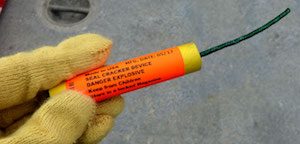Fishermen blasting “seal bombs” 30,000 times a month off Southern California
Ocean, Science Add comments They look small, about the size of a “cherry bomb” firecracker. They’re legal, exempt from the Marine Mammal Protection Act thanks to their functional purpose: protecting fishermen’s nets from seals and cetaceans poaching their catches, including squid, anchovies, and tuna.
They look small, about the size of a “cherry bomb” firecracker. They’re legal, exempt from the Marine Mammal Protection Act thanks to their functional purpose: protecting fishermen’s nets from seals and cetaceans poaching their catches, including squid, anchovies, and tuna.
But they are loud and used freely in waters off southern California. Divers report physical pressure waves hitting them from up to a mile away; they’re audible in the water out to tens of kilometers and have been recorded by Scripps Acoustic Ecology Laboratory hydrophones 37,000 times a month at peak fishing season—up to 500 blasts an hour at times.
A recent article in Hakai Magazine delves into this little-known ocean noise issue. “The amount of use is alarming,” says Scripp’s Simone Baumann-Pickering. “We know the noise poses a potential threat.” While earlier NOAA research with dolphin carcasses demonstrated they can cause physical damage at extremely close range (less than a meter), the Scripps team did not document any physical injuries, though they stress that behavioral impacts are likely. Divers and whale watch captains confirm that whales tend to avoid areas where the seal-bombs are in use; yet fishermen counter with reports of dolphins and whales being unfazed by their use (keeping the uncertainty cycle spinning, conservationists speculate that such non-response could be related to deafness from previous exposure to this or other loud noise).
In an effort to move beyond the conflicting anecdotal report, the Scripps researchers are now looking more closely at the effects of the noise on Risso’s dolphins, a squid-loving species that is commonly exposed. As Baumann-Pickering affirms, “In science, you have to measure the effects.”
Note: Hakai Magazine, published by a foundation in British Columbia, is well worth being on the radar of any ocean lover.
